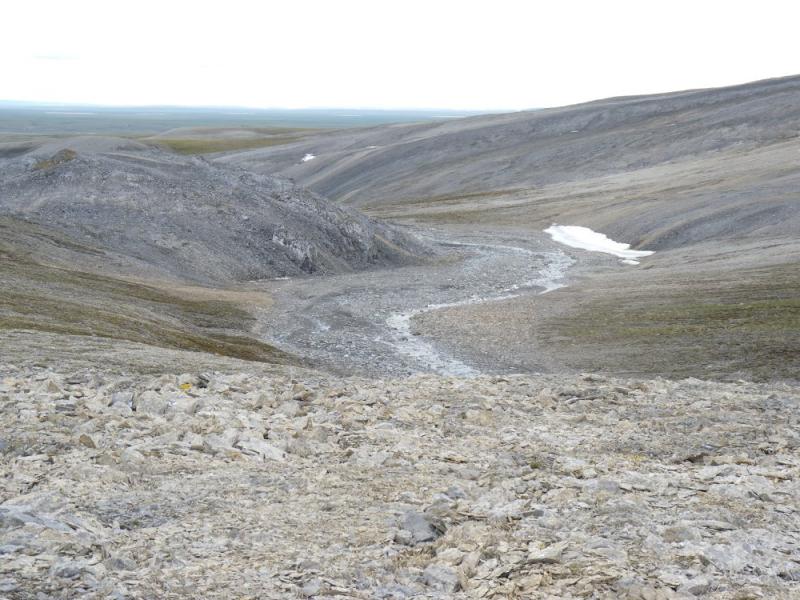Permafrost Thaw in Siberia Creates a Ticking 'Methane Bomb' of Greenhouse Gases, Scientists Warn
By: David Kindy (Smithsonian Magazine)


And then there is this.
The headline is little misleading because the increased methane emissions were coming from limestone outcrops and not from decaying organic material.

August 5, 2021 Permafrost covers 65 percent of Russian lands, but it's melting fast. © Mikhail Alekseev via University of Bonn
In recent years, climate scientists have warned thawing permafrost in Siberia may be a "methane time bomb" detonating slowly. Now, a peer-reviewed study using satellite imagery and a review by an international organization are warning that warming temperatures in the far northern reaches of Russia are releasing massive measures of methane—a potent greenhouse gas with considerably more warming power than carbon dioxide.
"It's not good news if it's right," Robert Max Holmes, a senior scientist at the Woodwell Climate Research Center, who was not involved in either report, tells Steve Mufson of the Washington Post. "Nobody wants to see more potentially nasty feedbacks and this is potentially one."
Published in the Proceedings of the National Academy of Sciences journal, the study of satellite photos of a previously unexplored site in Siberia detected large amounts of methane being released from exposed limestone. A heat wave in 2020 was responsible for the emissions along two large strips of rock formations in the Yenisey-Khatanga Basin, located several hundred miles north of the Arctic Circle.
Lead author Nikolaus Froitzheim, a geoscientist at the University of Bonn in Germany, is concerned about his study's findings. Interpreting this data correctly "may make the difference between catastrophe and apocalypse" as the climate crisis worsens, he tells Tara Yarlagadda of Inverse.
In 2020, temperatures in the basin rose nearly 11 degrees Fahrenheit above normal, causing the limestone to release ancient methane deposits that had been trapped inside. The data caught Fritzheim and other researchers by surprise, who anticipated finding gas in other locations.
"We would have expected elevated methane in areas with wetlands," he tells the Washington Post. "But these were not over wetlands but on limestone outcrops. There is very little soil in these. It was really a surprising signal from hard rock, not wetlands."
Another report echoes these anxieties. Published by the Climate Crisis Advisory Group (CCAG), it calls for a "global state of emergency" as temperatures continue to climb in Siberia and other Arctic regions. Permafrost covers 65 percent of Russian lands, but it's melting fast.
"Scientists have been shocked that the warm weather conducive to permafrost thawing is occurring roughly 70 years ahead of model projections," the CCAG warning states. It also points out that the Arctic could lose 89 percent of its permafrost by 2100, the Moscow Times reports.
The CCAG report cautions that warming temperatures could be pushing the Arctic toward an "irreversible" tipping point, causing the release of methane and other gases, as well as crumbling infrastructure in Siberia, including dams and a nuclear power plant.
"The story is simple," the report concludes. "Climate change is happening faster than anticipated. One consequence—the loss of ice in the polar regions—is also a driver for more rapid global heating and disastrously rapid global sea level rise."





Nothing to worry about. It's all Russia's fault. Let Russia deal with it.
Putin doesn't seem all that concerned
Well, of course Putin is not concerned. Putin is Russian, isn't he?
At least Putin can blame the sanctions.
Why would they care anyway a warmer Russia isn't going to hurt Russia or it's people. They have a lot of land for a relatively small population but most of it is a frozen wasteland. If you're Russian and all you care about is Russia it's not a bad thing at all, it will give them much more tillable cropland and a more comfortable climate. Unlike most of the world they have more than enough empty land for migration should any of the southern most regions suffer ill effects.
They talk about being " shocked and surprised", but if you look at it as the natural progression towards the next ice age then they would realize that it is impossible to stop it and we are not the cause.
From the article:
"Remember, the seas have risen 400 feet in the last 18,000 years. Just because current sea levels are familiar and comfortable to us, it doesn't mean that's where they're "supposed" to be. Sea levels have been higher and lower, temperatures have been hotter and cooler, but the humans’ self-perception of omnipotence remain the same.
The belief that mankind can alter the trajectory of forces far beyond our current capability is interesting but, at this time, not likely. At least the changes are slow enough to allow for adaptation or at least the development of technology and habitat that allow us to minimize the effects of those changes."
A voice of reason and wisdom amidst the chicken little hysteria
What's amazing is our brilliant scientific innovators cannot see the obvious.
The methane is escaping to the atmosphere and we can't stop it. What if we harvest that methane and use it for electricity generation coupled with carbon capture? We would obtain benefit from the harvested gas and by capturing the carbon we prevent the natural release of methane into the atmosphere.
We already have infrastructure to distribute and use natural gas. So the necessary investments would be to harvest the naturally escaping methane and to add carbon capture to our existing electricity generation. That would seem to be a more manageable problem than scrapping the existing infrastructure and starting over with solar and wind.
Even after we convert everything over to alternatives we will still have the problem of naturally escaping methane. And we will have destroyed our means of dealing with that problem.
I'm sure a big vacuum cleaner should do the trick.
Simply downsize plans for the one from Spaceballs and voila done